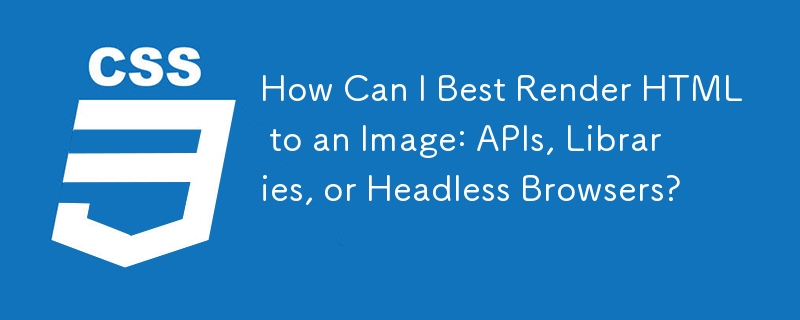 Web Front-end
Web Front-end
 CSS Tutorial
CSS Tutorial
 How Can I Best Render HTML to an Image: APIs, Libraries, or Headless Browsers?
How Can I Best Render HTML to an Image: APIs, Libraries, or Headless Browsers?
How Can I Best Render HTML to an Image: APIs, Libraries, or Headless Browsers?

Render HTML to an Image: A Comprehensive Guide
Converting HTML to an image format like PNG can be a challenge. While canvas offers a rudimentary approach, it falls short when it comes to rendering standard HTML elements. Here are several options that address this need with varying advantages and drawbacks:
1. API Solutions
Pros:
- JavaScript execution
- Near-perfect rendering
- Fast (with caching)
- Scale management
- Precise control
Cons:
- Paid for extensive usage
Examples:
- ApiFlash
- EvoPDF
- Grabzit
- HTML/CSS to Image API
2. Browser Rendering Libraries
Pros:
- Relatively quick conversion
Cons:
- Poor rendering quality
- No JavaScript execution
- Limited support for modern web features
- Installation and scaling difficulties
Examples:
- dom-to-image
- wkhtmltoimage
- IMGKit (Ruby wrapper)
3. PhantomJS with Wrappers
Pros:
- JavaScript execution
- Relatively quick
Cons:
- Poor rendering quality
- Limited support for modern web features
- Scaling and compatibility challenges
Examples:
- PhantomJS
- node-webshot
4. Chrome Headless with Wrappers
Pros:
- JavaScript execution
- Near-perfect rendering
Cons:
- Precise control difficulties
- Scalability challenges
- Slowness, especially with external links
Examples:
- Chrome Headless
- chrome-devtools-protocol
- Puppeteer (JavaScript wrapper)
Option Recommendations:
- For precise rendering and extensive control: ApiFlash, EvoPDF, or similar API solutions.
- For higher speed at the cost of rendering quality: dom-to-image, wkhtmltoimage, or their wrappers.
- For a balance between speed and quality: PhantomJS or Chrome Headless with careful configuration.
Disclosure: The author is the founder of ApiFlash. This answer aims to provide an unbiased evaluation of available options.
The above is the detailed content of How Can I Best Render HTML to an Image: APIs, Libraries, or Headless Browsers?. For more information, please follow other related articles on the PHP Chinese website!

Hot AI Tools

Undresser.AI Undress
AI-powered app for creating realistic nude photos

AI Clothes Remover
Online AI tool for removing clothes from photos.

Undress AI Tool
Undress images for free

Clothoff.io
AI clothes remover

Video Face Swap
Swap faces in any video effortlessly with our completely free AI face swap tool!

Hot Article

Hot Tools

Notepad++7.3.1
Easy-to-use and free code editor

SublimeText3 Chinese version
Chinese version, very easy to use

Zend Studio 13.0.1
Powerful PHP integrated development environment

Dreamweaver CS6
Visual web development tools

SublimeText3 Mac version
God-level code editing software (SublimeText3)

Hot Topics
 1393
1393
 52
52
 1205
1205
 24
24
 Vue 3
Apr 02, 2025 pm 06:32 PM
Vue 3
Apr 02, 2025 pm 06:32 PM
It's out! Congrats to the Vue team for getting it done, I know it was a massive effort and a long time coming. All new docs, as well.
 Building an Ethereum app using Redwood.js and Fauna
Mar 28, 2025 am 09:18 AM
Building an Ethereum app using Redwood.js and Fauna
Mar 28, 2025 am 09:18 AM
With the recent climb of Bitcoin’s price over 20k $USD, and to it recently breaking 30k, I thought it’s worth taking a deep dive back into creating Ethereum
 Can you get valid CSS property values from the browser?
Apr 02, 2025 pm 06:17 PM
Can you get valid CSS property values from the browser?
Apr 02, 2025 pm 06:17 PM
I had someone write in with this very legit question. Lea just blogged about how you can get valid CSS properties themselves from the browser. That's like this.
 A bit on ci/cd
Apr 02, 2025 pm 06:21 PM
A bit on ci/cd
Apr 02, 2025 pm 06:21 PM
I'd say "website" fits better than "mobile app" but I like this framing from Max Lynch:
 Stacked Cards with Sticky Positioning and a Dash of Sass
Apr 03, 2025 am 10:30 AM
Stacked Cards with Sticky Positioning and a Dash of Sass
Apr 03, 2025 am 10:30 AM
The other day, I spotted this particularly lovely bit from Corey Ginnivan’s website where a collection of cards stack on top of one another as you scroll.
 Using Markdown and Localization in the WordPress Block Editor
Apr 02, 2025 am 04:27 AM
Using Markdown and Localization in the WordPress Block Editor
Apr 02, 2025 am 04:27 AM
If we need to show documentation to the user directly in the WordPress editor, what is the best way to do it?
 Comparing Browsers for Responsive Design
Apr 02, 2025 pm 06:25 PM
Comparing Browsers for Responsive Design
Apr 02, 2025 pm 06:25 PM
There are a number of these desktop apps where the goal is showing your site at different dimensions all at the same time. So you can, for example, be writing
 Why are the purple slashed areas in the Flex layout mistakenly considered 'overflow space'?
Apr 05, 2025 pm 05:51 PM
Why are the purple slashed areas in the Flex layout mistakenly considered 'overflow space'?
Apr 05, 2025 pm 05:51 PM
Questions about purple slash areas in Flex layouts When using Flex layouts, you may encounter some confusing phenomena, such as in the developer tools (d...



